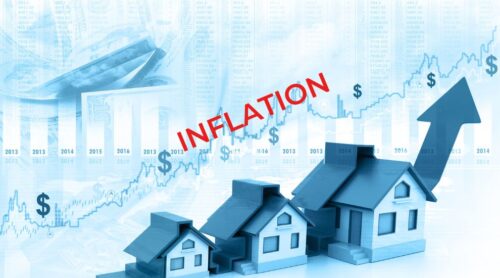INFLATION AND THE REAL ESTATE MARKET: TRENDS AND IMPLICATIONS
Introduction: Inflation is a persistent increase in the general price level of goods and services in an economy over a period of time. While inflation can impact various sectors, the real estate market is particularly sensitive to inflationary pressures. This article explores the relationship between inflation and the real estate market, examining the trends and implications that arise as a result.
- Impact of Inflation on Property Prices: Inflation can significantly influence property prices. When inflation rises, the cost of construction materials, labor, and other inputs also increases. This can lead to higher costs for developers and builders, resulting in elevated property prices. As a result, homebuyers and investors may face higher purchase prices, reducing affordability and potentially affecting demand in the real estate market.
- Rental Rates and Inflation: Inflation can also impact rental rates in the real estate market. As the general price level rises, the cost of living increases, and landlords may adjust their rental rates accordingly. Tenants may experience higher housing costs, which can affect their disposable income and overall affordability. Conversely, landlords may benefit from increased rental income, potentially impacting investment decisions and property market dynamics.
- Mortgage Rates and Financing: Inflation can influence mortgage rates, which have a direct impact on real estate affordability. When inflation rises, central banks often respond by increasing interest rates to curb inflationary pressures. This can lead to higher borrowing costs for homebuyers, potentially reducing their purchasing power. Additionally, higher mortgage rates may discourage potential buyers from entering the market, affecting demand and property prices.
- Regional Disparities in Real Estate: Inflationary trends can vary across different regions, leading to regional disparities in the real estate market. Some areas may experience higher inflation rates due to local factors such as supply shortages, high demand, or economic growth. This can create localized housing market bubbles and price fluctuations, making it essential for investors and homebuyers to carefully assess regional inflationary trends when making real estate decisions.
- Hedge against Inflation: Real estate is often considered a potential hedge against inflation. While inflation erodes the purchasing power of currency, property values may increase during inflationary periods. Real estate assets can provide a store of value and potentially appreciate over time, providing protection against inflation. However, it’s important to note that the correlation between inflation and real estate returns can vary, and other factors such as location, market conditions, and property type also play significant roles.
- Implications for Investors: Inflation can have implications for real estate investors. Rising inflation may lead investors to allocate more of their portfolios to real estate assets as a means of diversification and wealth preservation. However, it’s crucial for investors to assess market conditions, rental income potential, and the impact of inflation on financing costs before making investment decisions.
Conclusion: Inflation has significant implications for the real estate market, affecting property prices, rental rates, mortgage rates, and regional dynamics. Understanding the relationship between inflation and the real estate market is crucial for homebuyers, investors, and industry professionals. By closely monitoring inflationary trends, market participants can make informed decisions and adapt their strategies to navigate the ever-changing real estate landscape.


